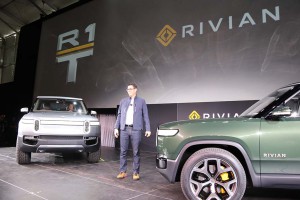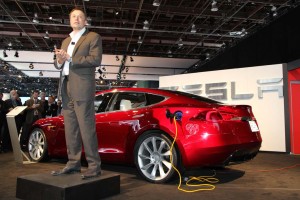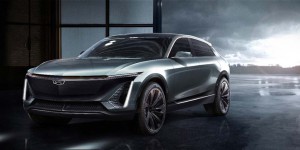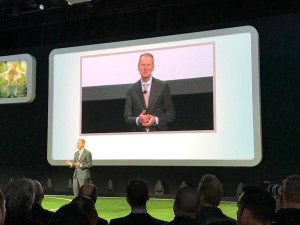Battery-electric vehicles may still account for less than 1% of the U.S. new vehicle market, but they have had a notable presence at this year’s North American International Auto Show – something that many credit to a manufacturer that was notably absent from Detroit’s Cobo Hall convention center: Tesla.
Cadillac made a major splash during the first media preview of this year’s show, when it not only revealed the new XT6 utility vehicle but announced that it will be the first General Motors brand to use the automaker’s new all-electric platform for another SUV debuting in 2021.
Throughout the show, automaker’s either revealed new battery cars and concepts or outlined their plans for an electrified future. Volkswagen, for one, announced plans to invest $800 million to add production of two new all-electric models at its plant in Chattanooga, Tennessee.
(Ford plans to follow a different path as it launches new SUVs. Click Here for the story.)
Tesla and Musk haven’t had a presence at the Detroit Auto Show since 2010, two years before the automaker’s Model S battery-sedan went on sale. But their presence has continued to be felt.
“What Tesla created was remarkable,” said R.C. Scaringe, the CEO of suburban Detroit-based Rivian, a start-up planning to build both a battery-electric SUV, as well as an all-electric pickup. Musk, “took electric cars and made them cool. He disproved an untruth that electric cars were slow and like golf carts,” said Scaringe, speaking at the Automotive News World Congress, an industry confab overlapping the NAIAS.
While there are still plenty of skeptics who question Tesla’s long-term viability, despite the company’s unexpectedly strong third-quarter profit, there’s no question that it is growing sales at a rapid rate. It delivered an estimated 140,000 of its Model 3 sedans alone in 2018, and when the older Models S and X were added in, Tesla topped its sales volume for every previous year combined.
The Model 3, in particular, was the only electrified vehicle to top sales of 10,000 a month in 2018, noted Jim Lentz, the CEO of Toyota North America, during a question-and-answer session at the World Congress.
That said, the Toyota executive downplayed his rival’s significance, especially in the highline segment. Despite the fact that most Models S and X go out the door for more than $100,000, Lentz said, “I don’t consider Tesla a luxury brand.”
(Lentz says EVs “aren’t ready to take over the world.” Click Here for the story.)
However you define it, the California-based carmaker has “shown at least one path to profitability” for battery-electric vehicles, or BEVs, said Stephanie Brinley, principle analyst with IHS Market.
That’s no mean feat. Only a few years ago, former Fiat Chrysler Automobiles CEO Sergio Marchionne, only half-jokingly asked potential customers not to buy the then-new Fiat 500e battery-electric vehicle, complaining that the automaker lost about $10,000 on each one it sold. The situation hasn’t much improved. His successor, Mike Manley, said this week that FCA can recover only 60% of the added cost for electrified powertrain technology. That translates into continued losses, even though Manley said the company will likely continue ramping up production of hybrids, plug-ins and BEVs.
On or off the record, Tesla is a target for its rivals, Volkswagen CEO Herbert Diess promising to quickly fall into place as the number two maker of all-electric models by early in the coming decade. Longer-term, he is determined to nab the sales crown from his California rival, with as many as 50 different all-electric models alone expected to be in the portfolio of VW’s various brands – including Audi, Porsche and Bentley – by mid-decade.
The cost of getting there won’t be cheap, VW expecting to spend north of $100 billion just to develop those new models, and billions more on the factories that will build them, including the one in Tennessee.
(Click Here for more on VW’s $800 million EV plant.)

“What Tesla created was remarkable,” said R.C. Scaringe, shown here with the two battery-electric trucks his start-up is developing.
The price tag is so significant that automakers are forming unprecedented alliances. On Tuesday, VW and Ford announced they would form a joint venture covering commercial vehicles and pickups, but CEO Diess all but promised a second alliance involving joint work on electric vehicles will follow. GM and Honda already have linked up to develop next-generation batteries, and Toyota and Mazda are building a plant in Alabama that will produce new electric vehicles.
While analyst Brinley notes that strict new emissions and mileage regulations are key reasons why automakers are increasing their focus on electrified vehicles, she adds that, Tesla “has changed some of the discussion in the landscape and, for some, has proven it will work.”
Early on, Musk cautioned that the success of Tesla was far from certain but, he added, he would be happy if he just helped prove to the world that battery-electric vehicles are a viable alternative. The increasing interest in that technology means he probably will be able to claim at least some of the credit.



